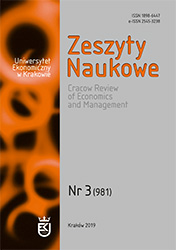Efekty makroekonomiczne polityki fiskalnej i monetarnej w gospodarkach Europy Środkowej i Wschodniej
Macroeconomic Effects of Fiscal and Monetary Policies in the Central and East European Countries
Author(s): Viktor Shevchuk, Roman Kopych, Mariana HolynskaSubject(s): Economy, National Economy, Public Finances
Published by: Wydawnictwo Uniwersytetu Ekonomicznego w Krakowie
Keywords: budget balance; money supply; current account; business cycle; producer price inflation
Summary/Abstract: Objective: The aim of this paper is to study the effects of budget balance and money supply on producer price inflation (PPI), the current account balance and the output gap for five Central and East European (CEE) countries (Bulgaria, the Czech Republic, Hungary, Poland and Romania). Research Design & Methods: Based on the quarterly data over the 2000–2017 period, macroeconomic effects of the budget balance and money supply are estimated with the Structural Vector Autoregressive (SVAR) model, which anticipates reliance of the money supply upon the current account balance on impact, with a simultaneous dependence of the latter upon the business cycle. Findings: A budget surplus did not cause any output losses in any of the five CEE countries. For three of the countries (Bulgaria, the Czech Republic, Poland), a budget surplus is associated with decelerating producer price inflation and improvement in the current account balance (the Czech Republic, Hungary, Poland). A budget surplus is likely to bring about an increase in the money supply. Expansionary monetary policy is a factor behind either worsening of the budget balance (Bulgaria, Poland), or a short-lived improvement in it (the Czech Republic, Hungary). Macroeconomic effects of the money supply tend to be heterogeneous, supporting both demand-side and supply-side transmission mechanisms. Implications / Recommendations: Our results favour conservative fiscal and monetary policies in all five of the CEE countries, particularly in the Czech Republic and Poland. Contribution: The scientific contribution of the article is that it justifies the use of the dependent economy model, with output disaggregated into tradable and nontradable sectors, for analysis of economic policy in the CEE countries.
Journal: Zeszyty Naukowe Uniwersytetu Ekonomicznego w Krakowie
- Issue Year: 981/2019
- Issue No: 3
- Page Range: 43-62
- Page Count: 20
- Language: Polish

